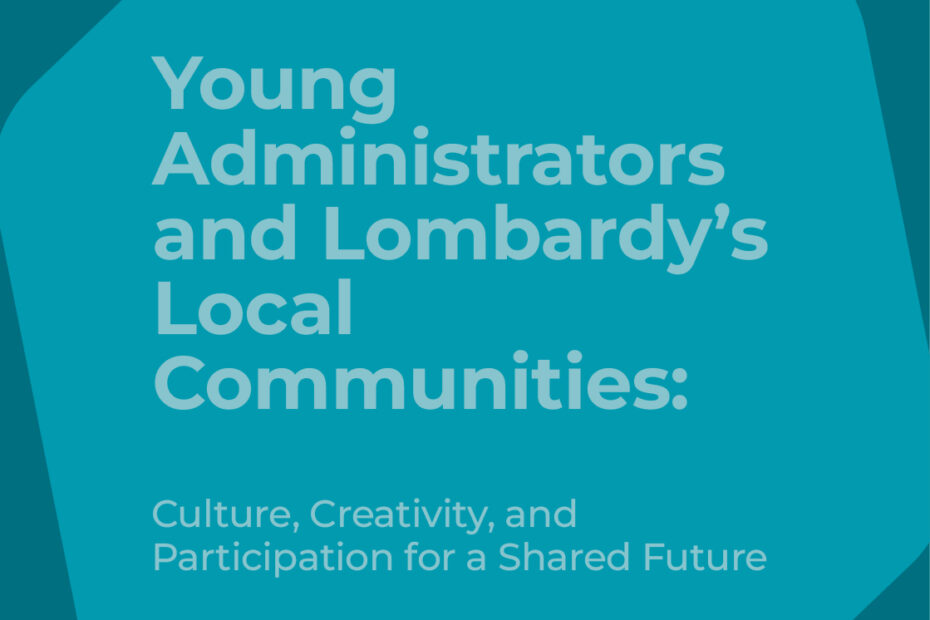In Lombardy, a new generation of young administrators is progressively redefining the relationship between local institutions, communities, and younger generations. This represents a profound cultural and operational shift, emerging from the everyday fabric of many small- and medium-sized municipalities across the region. Its roots lie in active participation, the enhancement of local identity, and social innovation. Supported and coordinated by ANCI Lombardia, this movement is establishing itself as a governance model that sees young people not merely as recipients of public policies, but as true agents of transformation.
Crema: A Civic Laboratory Between Past and Future
Among the most emblematic cases is the city of Crema, which has become a civic laboratory of reference. Here, a unified strategy of regeneration merges youth policies, culture, and local development, thanks to the efforts of administrators under 30 who can read today’s needs and project them into the future.
Andrea Bergamaschini, city councilor with responsibility for youth policies, has promoted an approach grounded in rediscovering intangible heritage — such as dialect, craftsmanship, folk music, history, and gastronomy — and transforming it into a driver of sustainable development. According to Bergamaschini, the value of a territory does not reside solely in its places, but in the stories we are able to tell about them. Building a strong, shared narrative is the first step in stimulating cultural entrepreneurship and launching lasting initiatives.
In Crema, culture is not understood as a set of institutional activities to be passively consumed, but as a living material to be shaped and reinterpreted. Young administrators, associations, and citizens work together to create events, digital itineraries, and tourism initiatives that center around people’s everyday experiences. Even the international success of the film “Call Me by Your Name,” shot in Crema, became a valuable opportunity: the generational tourist flow it attracted was intelligently leveraged to launch participatory cultural projects and promote the area using a fresh, contemporary language.
Pezzaze: From a Giant Bench to a Film by Young Locals
A similar example, though in a very different setting, can be found in Pezzaze, a small mountain village in the province of Brescia. Here, young councilor Marco Dessi promoted the installation of a Giant Bench as part of the Big Bench Community Project, actively involving local youth in the design, construction, and communication aspects. The aim was twofold: to create a unique tourist attraction and, at the same time, to strengthen young people’s sense of belonging by putting them at the center of a real decision-making process.
The project later expanded with the construction of a “European Bench” in collaboration with the local secondary school, and the production of a short film made entirely by local youth, which is now screened at local events. These simple initiatives demonstrate the powerful potential of connecting schools, local government, and civil society when inspired by a shared goal: empowering those who too often feel like spectators of public life.
A New Territorial Paradigm: From Delegation to Empowerment
What powerfully emerges from these experiences is a new operational model that combines creativity, territorial identity, and active participation, where the role of young people is not symbolic, but practical and transformative. The added value in this scenario comes from the work of ANCI Lombardia, which acts not only as a coordinator among local entities, but as a support network and amplifier of best practices.
Cultural entrepreneurship is another pillar of this journey. For Bergamaschini, the opportunity for young people to turn elements of tradition into viable businesses is clear proof that culture can become an engine of economic development as well as social cohesion. Nancy Pederzani, a young city councilor, emphasizes the importance of listening as a political act — not just a procedural formality, but a foundation for building alliances across generations. Dessi highlights the need to integrate creativity and technical skills: networking, communication, and resource management are essential to ensure that good ideas don’t remain isolated, but instead evolve into long-term projects.
A new territorial paradigm is taking shape. In many Lombard communities, a model of participatory governance is forming where youth and local administrations work side by side to build a shared future. A future not built on delegation, but on empowerment. Where institutions don’t dictate the agenda, but instead facilitate, support, and co-design. Where mistakes aren’t treated as failures, but as natural steps in the creative process.
The experiences of Crema and Pezzaze — alongside many others collected by ANCI Lombardia — clearly show that the answers to today’s challenges can come directly from young people, if they are given the tools to act. At stake is not only the quality of life in our communities, but also how we imagine the future of local democracy.
By collecting and connecting these experiences, ANCI Lombardia is building a dynamic map of youth-driven energy across the territory, helping it to emerge, grow stronger, and spread. It is in this intersection of local experimentation and systemic vision that a true intergenerational policy can be born — one capable of addressing the challenges of our time, not with top-down formulas, but with solutions co-created from the ground up.


